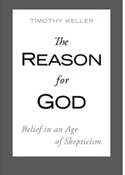The Reason for God


I’m a certified member of the Tim Keller fan club. I listen to his sermons. I read everything he writes. I even belong to the Facebook fan club. Few thinkers or practitioners have influenced me more than he has. I am not the biggest fan out there, but I’m certainly a member of the club. This is dangerous, because nobody can live up to all that.
But Keller isn’t the first to face the challenges of a growing profile and unrealistic expectations, and thankfully, he continues to use his influence wisely. The Reason for God: Belief in an Age of Skepticism, now on the New York Times bestseller list, is likely to multiply his influence even more, not only within the church but also within a culture with serious doubts about Christianity.
In a sense, there’s nothing new in this book. It’s all out there in other places, just like all the ingredients of a meal prepared by a chef are there in the grocery store. In The Reason for God, you have presuppositional apologetics in the tradition of Van Til, as well as generous doses of C.S. Lewis, the subtle but strong influence of Jonathan Edwards, as well as engagement with contemporary thinkers and writers.
What is unique is how Keller brings all together; in other words, the way these ingredients are mixed. Keller aptly deals with common doubts and objections to Christianity, such as “There can’t be just one true religion” and “How can a loving God send people to hell?” Behind every doubt is an alternate set of beliefs. “The only way to doubt Christianity rightly and fairly,” Keller writes, “is to discern the alternate belief under each of your doubts and then to ask yourself what reasons you have for believing it.” Keller does this with each of the objections to Christianity, showing that none of the objections make Christianity impossible or even implausible.
Doubting our doubts about Christianity is only part of the journey. In the second half of the book, Keller offers reasons for faith, demonstrating that the Christian faith makes the most sense of the world. “I ask you to put on Christianity like a pair of spectacles and look at the world with it. See what power it has to explain what we know and see.”
What really stands out about this book, besides its content, is the way that Keller engages with these issues. He is civil, respectful, winsome, and ironic, but never hostile. He does not belittle those with alternate beliefs, even as he directly examines and challenges those beliefs. Keller models a way of relating to those who disagree, and provides a model for all of us. He shows how one can possess an robust and orthodox Christian faith, and yet winsomely engage with those with completely different and hostile beliefs.
Keller’s wife, Kathy, has said that the mark of a good sermon is that people stop taking notes part way through. It starts rationally, like a lesson, but ends with an encounter with Jesus. The Reason for God is full of rational arguments, but it doesn’t end there. By the end of the book we encounter beauty, and some of the most profound expressions of the Christian faith I’ve read.
Last Sunday, somebody thanked me for making this book available to them. They’ve been looking for a book like this for some time, and they’re loving it. I don’t think he will be the last one. The Reason for God is a book that deserves to be read not only by Christians, but by those who have doubts – even by those who are hostile. It covers important issues, and shows not only the rationality but the beauty of the Christian faith. Just as importantly, it does so in a way that is genuinely respectful to the reader no matter what their beliefs. I hope it will be read widely.
Book from Amazon.com | at Amazon.ca
Audiobook from Amazon.com | at Amazon.ca
ReasonforGod.com





